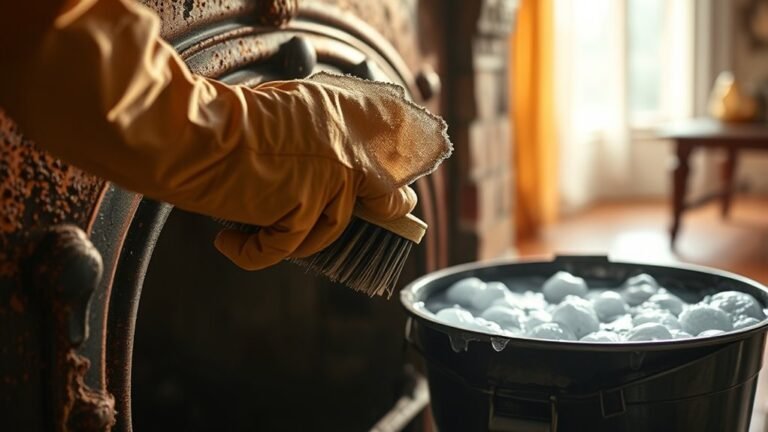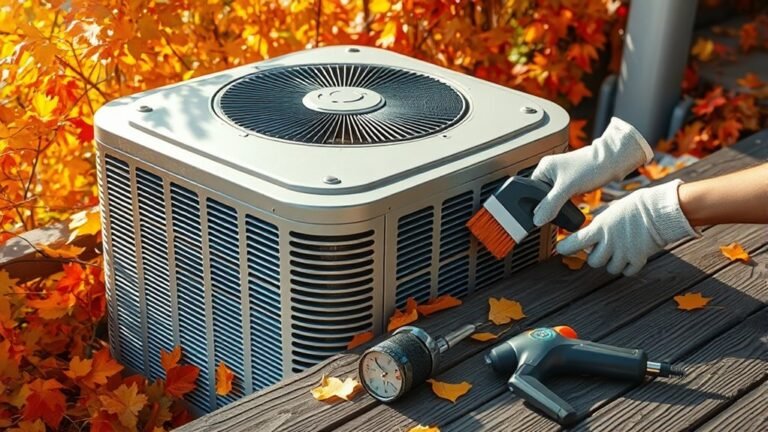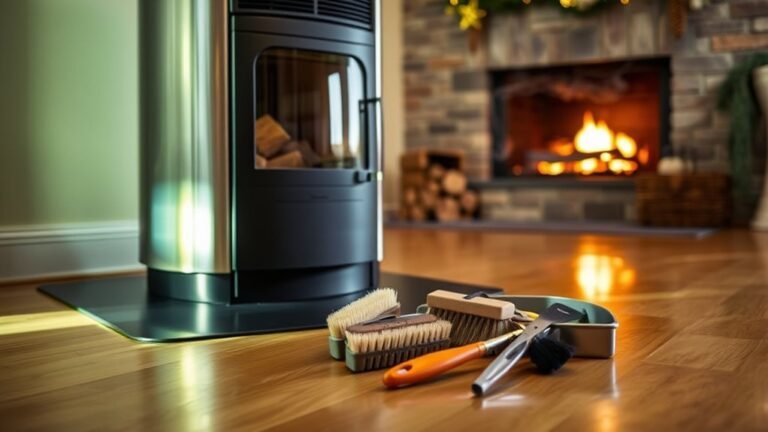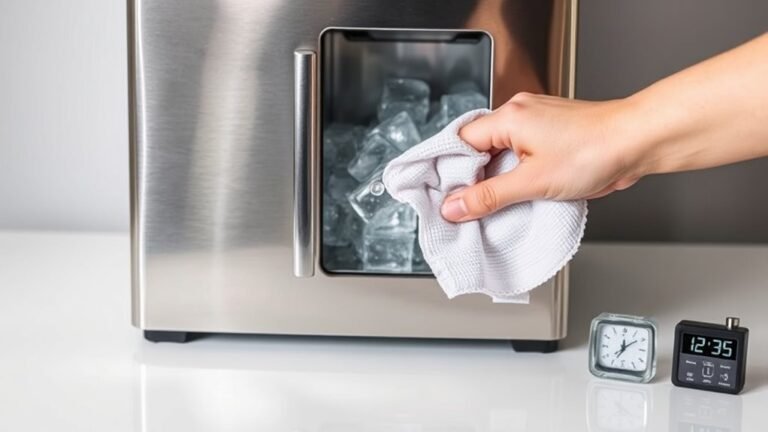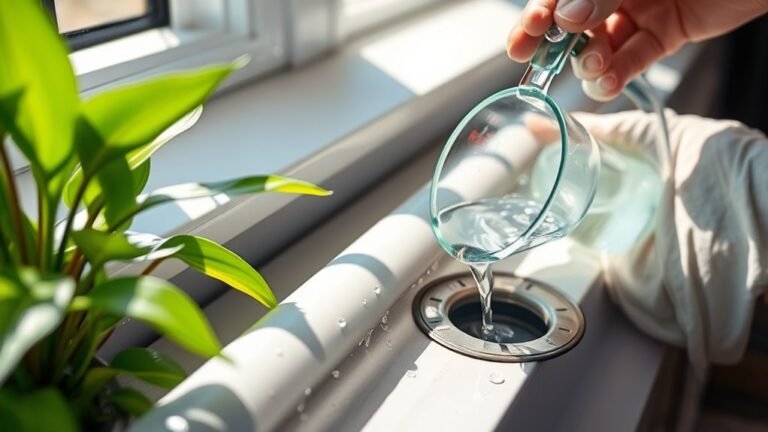Disinfecting High-Touch Areas in Air Fryer
To disinfect high-touch areas on your air fryer like handles, control buttons, and basket edges, unplug it first and use a mild disinfectant or 70% isopropyl alcohol on a soft cloth—avoid spraying directly to prevent moisture damage. Clean daily to limit grease and germs buildup, focusing on buttons and handles. Use gentle, kitchen-safe cleaners and dry thoroughly to keep your appliance safe and hygienic. Exploring proper cleaning steps can help maintain your air fryer’s performance and cleanliness.
Identifying High-Touch Areas on Your Air Fryer
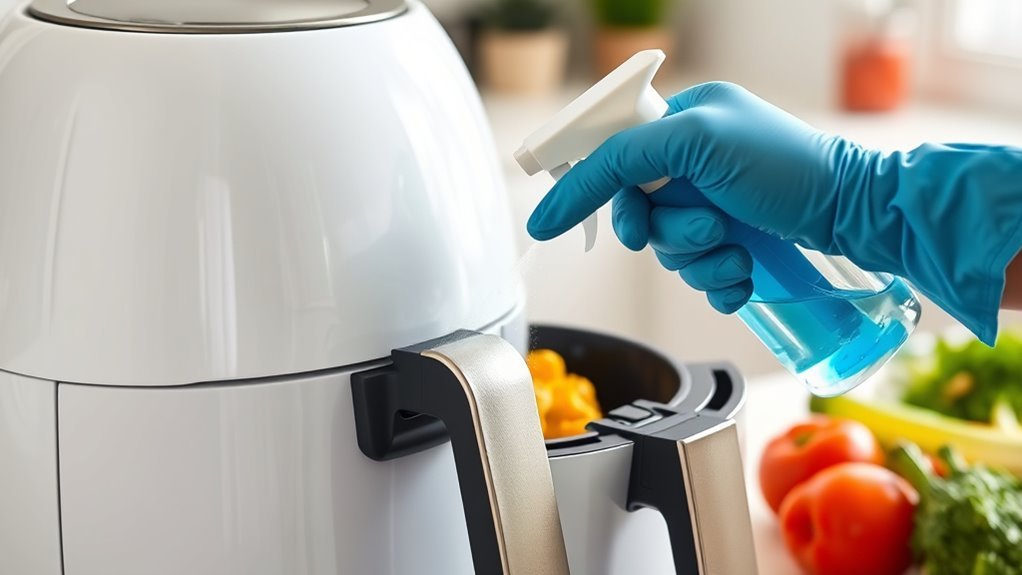
Several key areas on your air fryer receive frequent contact during use, making them critical spots to focus on when disinfecting. These high touch surfaces typically include the control panel, handle, and the basket release button. You often touch these areas directly, which increases the risk of transferring germs. Properly identifying these zones is vital for effective air fryer maintenance. Overlooking them can compromise your health and the appliance’s longevity. Pay close attention to any part you handle regularly, such as the exterior buttons and the basket’s edges. By targeting these high touch surfaces during routine cleaning, you guarantee a safer cooking environment and maintain your device’s performance. Being mindful about these details grants you the freedom to enjoy your air fryer confidently. For best results, use gentle, non-abrasive cleaners to protect your air fryer’s finish while disinfecting.
Best Cleaning Agents for Disinfecting Air Fryers
Now that you know which parts of your air fryer need the most attention, choosing the right cleaning agents becomes important. You want products that effectively kill germs without damaging the appliance. Here are the best options:
- Best disinfectant sprays formulated for kitchen use—they’re quick-drying and safe on plastic surfaces.
- Antibacterial wipes offer convenience for wiping handles and buttons without excess moisture.
- Mild dish soap mixed with warm water, ideal for removing grease before disinfecting.
- Isopropyl alcohol solutions (70%) for a thorough sanitizing effect, but use sparingly to avoid surface damage.
Avoid harsh chemicals like bleach or abrasive cleaners that can degrade your air fryer’s finish. Using these agents carefully guarantees both cleanliness and longevity, giving you freedom to cook safely and confidently. Regular cleaning also helps break the cycle of contamination by removing germs and bacteria that accumulate on frequently touched surfaces.
Step-by-Step Guide to Cleaning the Handle

Before cleaning your air fryer handle, first identify its material to choose the right cleaning solution. You’ll want to use disinfectants that are effective yet safe for the handle’s surface. Following proper sanitizing steps guarantees thorough cleaning without damaging the handle. For best results, consider using safe cleaning solutions that avoid harsh chemicals and excessive moisture.
Handle Material Identification
Identifying the handle material is essential to guarantee you use the appropriate cleaning method without causing damage. Different handle materials require specific care to maintain their appearance and handle durability. Before you start cleaning, take a moment to examine the handle closely.
- Plastic Handles: Often smooth and lightweight; resist moisture but can discolor with harsh chemicals.
- Metal Handles: Usually stainless steel or aluminum; durable but prone to fingerprints and corrosion if not cleaned properly.
- Silicone or Rubber Handles: Flexible and heat resistant; can degrade if exposed to strong solvents.
- Wooden Handles: Natural and sturdy but sensitive to water and harsh cleaners, which can crack or warp the wood.
Knowing the handle materials helps you preserve your air fryer’s functionality and longevity safely.
Suitable Cleaning Solutions
Although choosing the right cleaning solution depends largely on the handle material, you’ll want to select gentle yet effective products to avoid damage. For plastic or silicone handles, safe disinfectants like diluted isopropyl alcohol or mild dish soap work well without causing wear. Stainless steel handles can tolerate a wider range of safe disinfectants but avoid abrasive chemicals. Eco friendly solutions, such as vinegar diluted with water or plant-based cleaners, offer a non-toxic alternative suitable for most handle types. Avoid harsh bleach or ammonia-based products, as they can degrade materials or leave harmful residues. Always test your chosen solution on a small, inconspicuous area first. By selecting appropriate, safe disinfectants and eco friendly solutions, you protect your air fryer’s handle while maintaining a clean, healthy environment.
Proper Sanitizing Techniques
When you clean your air fryer handle, you’ll want to follow a careful, step-by-step process to assure effective sanitizing without causing damage. Using proper sanitizing methods guarantees you eliminate germs while preserving the handle’s integrity. Choose disinfecting tools like microfiber cloths and soft brushes to avoid scratches.
- Power off and unplug the air fryer for safety.
- Dampen a microfiber cloth with a suitable disinfectant solution.
- Gently wipe the handle, focusing on crevices where dirt accumulates.
- Use a soft brush for stubborn spots, then dry thoroughly with a clean cloth.
Following these precise steps lets you maintain hygiene freely without compromising your device. Proper sanitizing techniques keep your air fryer safe and ready for every use.
Proper Techniques for Sanitizing Control Buttons
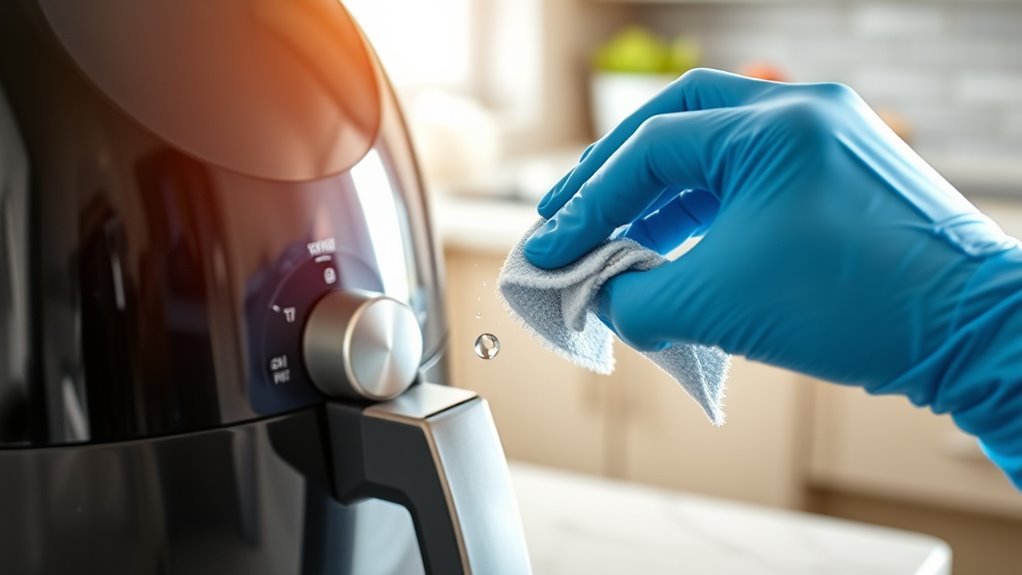
Because control buttons are frequently touched and can harbor germs, you need to sanitize them carefully to avoid damage. Start by unplugging the air fryer to guarantee safety. Use a soft cloth slightly dampened with a mild disinfectant or a mixture of water and isopropyl alcohol, applying it gently over the buttons. Avoid excess moisture, as liquid can seep into the device and cause electrical issues. Never spray cleaner directly onto the control panel. When choosing sanitizing techniques, prioritize those that preserve the integrity of the button surfaces and electronic components. After wiping, dry the buttons thoroughly with a clean, dry cloth. This careful control button care prevents malfunction while maintaining hygiene, giving you the freedom to use your air fryer confidently and safely. Utilizing cotton swabs or soft-bristled brushes can help reach tight spaces around buttons for a more thorough clean.
How to Disinfect the Air Fryer Lid Effectively
Since the air fryer lid often comes into contact with food particles and steam, you’ll want to disinfect it thoroughly to prevent bacterial buildup. Different lid materials—such as plastic, glass, or metal—require careful handling to avoid damage. Prioritize disinfectant safety by choosing agents compatible with your lid’s material and food-contact surfaces. Here’s how you can disinfect the lid effectively:
- Unplug the air fryer and let the lid cool completely before cleaning.
- Use a mild detergent and warm water to remove visible debris first.
- Apply a food-safe disinfectant recommended for your lid materials, avoiding harsh chemicals.
- Rinse thoroughly and dry with a clean cloth to prevent moisture retention.
Using eco-friendly cleaning products ensures safety for both your air fryer and your household environment.
Following these steps guarantees your air fryer lid stays clean and safe without compromising its integrity.
Cleaning the Air Fryer Basket and Tray
Although the air fryer basket and tray are designed to withstand frequent use, proper cleaning is crucial to maintain their performance and hygiene. For effective basket maintenance, remove any food residue immediately after use. Wash the basket with warm, soapy water, using a soft brush to reach crevices without damaging the non-stick surface. Rinse thoroughly and dry completely before reinserting. Tray sanitization requires similar care; soak it briefly if stubborn grease accumulates, then scrub gently to avoid scratches. Avoid abrasive cleaners or metal utensils that can compromise the coating. Regular cleaning not only preserves your air fryer’s efficiency but also minimizes bacterial buildup on these high-touch components. By following these precise steps, you guarantee your appliance remains safe and ready for your next cooking adventure. Additionally, incorporating regular maintenance practices helps ensure the longevity and optimal function of your kitchen appliances.
Using Natural Disinfectants Safely on Your Air Fryer
When you want to keep your air fryer clean without harsh chemicals, natural disinfectants offer a safer alternative. Using natural alternatives means you can maintain hygiene while avoiding toxic residues. To use these safely, follow these guidelines:
- Dilute vinegar or lemon juice with water to prevent damage to surfaces.
- Apply with a soft cloth to avoid scratching the non-stick coating.
- Avoid soaking any electrical components to protect internal parts.
- Allow all parts to dry completely before reassembling to prevent moisture buildup.
Additionally, using essential oils like lemon or tea tree in diluted form can provide antibacterial and antifungal properties to enhance cleaning effectiveness.
Frequency Recommendations for Disinfecting Your Air Fryer
You should clean the high-touch areas of your air fryer daily to prevent buildup of grease and bacteria. In addition, a weekly deep disinfection helps guarantee thorough sanitation of all components. Sticking to this routine will keep your appliance safe and functioning properly.
Daily Cleaning Routine
Regularly disinfecting your air fryer’s high-touch areas is essential to maintain hygiene and prevent buildup of grease and bacteria. Sticking to a consistent cleaning schedule guarantees your appliance stays safe and efficient. Here’s a straightforward daily cleaning routine to incorporate into your hygiene practices:
- Unplug the air fryer and let it cool completely.
- Wipe down the exterior, control panel, and handle with a damp cloth and mild disinfectant.
- Remove and clean the basket and tray with warm, soapy water; dry thoroughly.
- Check and clean the vent openings gently with a dry brush to avoid dust accumulation.
Following this routine daily keeps your air fryer fresh, reduces contamination risks, and extends its lifespan, giving you freedom from worry during use.
Weekly Deep Disinfection
Although daily cleaning keeps your air fryer generally hygienic, a weekly deep disinfection is crucial to eliminate bacteria and grease buildup in hard-to-reach areas. To maintain your appliance’s efficiency and safety, establish a weekly schedule that fits your routine without compromise. Use a detailed cleaning checklist covering all high-touch surfaces: the basket, tray, door handle, and control panel. Begin by unplugging the air fryer and allowing it to cool completely. Then, remove removable parts for soaking and scrubbing with warm, soapy water. Wipe down the interior and exterior with a disinfectant safe for kitchen appliances. This systematic approach guarantees thorough sanitation, preventing contamination and extending your air fryer’s lifespan. Stick to this weekly routine, and enjoy the freedom of cooking with confidence every time.
Tips for Maintaining Hygiene Between Deep Cleanings
Since frequent deep cleanings aren’t always practical, adopting simple daily habits can help maintain hygiene on your air fryer’s high-touch areas. Consistent hygiene practices between deep cleanings reduce buildup and contamination risks. To keep your air fryer fresh, consider these tips:
Simple daily habits keep your air fryer’s high-touch areas clean between deep cleanings.
- Wipe down handles and buttons with a damp cloth daily to remove oils and residues.
- Use disinfectant wipes safe for kitchen appliances for quick surface sanitation.
- Avoid touching high-touch areas with greasy or dirty hands to minimize grime accumulation.
- Stick to a cleaning schedule, noting days for light cleaning and scheduling weekly deep disinfections.
- Always ensure that disinfectants are applied according to product directions to maximize their effectiveness.
Frequently Asked Questions
Can Disinfecting Damage the Air Fryer’S Non-Stick Coating?
You might worry if disinfecting can hurt your air fryer’s non-stick coating. Harsh chemicals or abrasive scrubbing can indeed shorten non-stick longevity. To keep your freedom of use intact, opt for gentle disinfectants and soft cloths. Alternative cleaning methods like diluted vinegar or mild soap help protect the coating while still keeping things sanitary. Being cautious guarantees your air fryer stays effective and easy to clean for a long time.
Is It Safe to Use Bleach on Air Fryer Surfaces?
Did you know that over 60% of kitchen appliances harbor harmful bacteria? Using bleach on your air fryer surfaces isn’t safe—it can damage the non-stick coating and release toxic fumes. Instead, opt for bleach alternatives like diluted vinegar or mild dish soap for safe cleaning. These options keep your appliance in great shape and protect your freedom to cook worry-free, without risking your health or the longevity of your air fryer.
How Long Should Disinfectants Remain on the Air Fryer to Be Effective?
You need to pay close attention to the disinfectant dwell time to guarantee effective cleaning. Most disinfectants require you to leave them on the surface for at least 4 to 10 minutes to kill germs properly. Don’t rush wiping it off too soon, or you might compromise the disinfectant’s power. Always check the product label for specific instructions to maintain safety and maximize freedom from harmful bacteria.
Can Disinfecting Affect the Taste of Food Cooked Afterward?
You might worry that disinfecting could cause taste alteration in your food, but if you use the right products and follow instructions, it shouldn’t affect flavor. Ensuring proper rinsing or wiping down after disinfecting helps maintain food safety and prevents residue buildup. Always allow surfaces to dry fully before cooking again, so you keep both taste and safety intact while enjoying your freedom to cook confidently.
Are There Specific Disinfectants to Avoid for Air Fryer Use?
You might think any disinfectant is fine, but that’s not the case when it comes to air fryer safety. Avoid bleach-based or ammonia disinfectant types, as their strong fumes can linger and affect food taste or even pose health risks. Instead, opt for mild, food-safe cleaners or alcohol-based wipes. This way, you keep your freedom to cook safely without worrying about harmful residues or compromised flavors.

